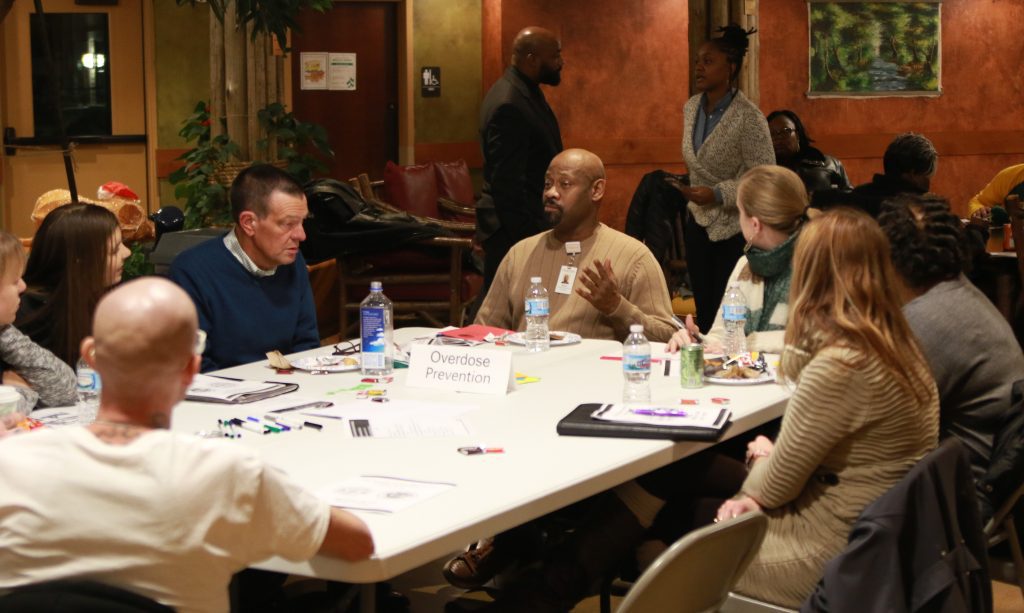Drug Task Force Seeks Community Input
City-County Heroin, Opioid and Cocaine Task Force seeks solutions to drug epidemic.

Participants at the City-County Heroin, Opioid and Cocaine Task Force’s fourth community engagement session meet in their focus groups. Photo by Max Nawara/NNS.
John Russell doesn’t consider himself a “former” addict. He’s doing well in recovery, but he acknowledges that he’ll be dealing with addiction for the rest of his life.
At one of the meetings he attends to manage his recovery, Russell learned about Milwaukee’s City-County Heroin, Opioid and Cocaine Task Force.
The task force, charged with investigating and making recommendations on how to reduce drug overdoses in Milwaukee and Milwaukee County through a public health lens, holds community engagement sessions for experts and affected community members — such as Russell — to offer solutions to the city’s drug epidemic.
“We need to have more support from those that have actually experienced addiction firsthand rather than just having people who think they know the issue making all the decisions on the things that are supposed to help us,” Russell said.
Russell participated in a focus group on prevention and education at the most recent community engagement session, held last month.

John Russell, a recovering addict, votes on proposed solutions for Milwaukee’s overdose epidemic. Photo by Max Nawara/NNS.
“I came up with something,” he said. “For instance, maybe a television program that says, ‘Make it cool to be clean.’ When I was growing up it was portrayed through the media that the cool guys were the ones that smoked cigarettes, drank beer and did drugs.”
He also said the focus group discussed getting better funding for drug safety programs in schools and implementing safe injection sites.
Tiffinie Cobb, substance abuse and injury prevention manager at the Milwaukee Health Department, said that the goal of the task force is to reduce substance abuse-related overdoses.
In researching its plan to reduce overdoses, task force members decided they needed to get a better idea of what was going on in affected communities. “[Our research] led into our community engagement sessions,” said Cobb.
The task force’s initial plan was released in April. Recommendations included funding prevention programs to keep individuals from developing substance use disorder; establishing systematic efforts to prevent drug trafficking among youth; ensuring adequate access to timely, affordable and quality services for all people with substance use disorders; and developing programs in collaboration with the criminal justice system that treat addiction as a disease, while working to reduce the availability of illicit substances.
Cobb said that there were already a number of community-backed initiatives trying to tackle Milwaukee’s drug and overdose epidemic, which has led to 260 drug-related deaths so far this year. One example is Milwaukee County Substance Abuse Prevention Coalition, an organization that focuses on using youth and family education to communicate the harmful consequences of drug abuse.
Ald. Russell Stamper and Ald. Michael Murphy, members of the task force, emphasized the importance of community input.
The first community engagement session was held in June. The task force has had three others since then with an average of about 48 participants per session, according to Cobb. Each session has five focus groups, covering overdose prevention, treatment, prevention and education, criminal justice and community collaboration.
Cobb said that the task force takes these brainstorming sessions into account while identifying how to combat Milwaukee’s epidemic.
She also added that the community engagement sessions have been “well-received,” and that task force members have been able to hear from people from all walks of life.
Russell said he was excited to be a part of these sessions.
“I’m glad to be a part of something that can help build the community and really put this on the forefront,” he said. “Drug addiction knows no bounds. It doesn’t discriminate. I’m just grateful for the opportunity.”
This story was originally published by Milwaukee Neighborhood News Service, where you can find other stories reporting on eighteen city neighborhoods in Milwaukee.
More about the Opioid Crisis
- Milwaukee County Executive David Crowley Announces Over $9 Million for Initiatives to Combat Opioid Epidemic - County Executive David Crowley - Jul 17th, 2025
- AG Kaul, 45 Other Attorneys General Plan to Join $720 Million Settlement with Eight Opioid Drug Makers - Wisconsin Department of Justice - Jul 14th, 2025
- Attorney General Kaul Announces Consent Judgment with Kroger Over Opioid Crisis - Wisconsin Department of Justice - Mar 21st, 2025
- Baldwin Votes to Strengthen Penalties, Step Up Enforcement Around Deadly Fentanyl - U.S. Sen. Tammy Baldwin - Mar 17th, 2025
- Wisconsin Communities Get Millions From Opioid Settlement as Deaths Decline - Evan Casey - Mar 1st, 2025
- MKE County: County Creates Easy Public Access To Overdose Data - Graham Kilmer - Feb 18th, 2025
- Milwaukee County Executive David Crowley and the Office of Emergency Management Launch New Overdose Dashboard - County Executive David Crowley - Feb 18th, 2025
- Fitzgerald Advances Legislation to Fight Opioid Epidemic - U.S. Rep. Scott Fitzgerald - Feb 6th, 2025
- Milwaukee Is Losing a Generation of Black Men To Drug Crisis - Edgar Mendez and Devin Blake - Jan 31st, 2025
- Milwaukee County’s Overdose Deaths Declined For Second Straight Year - Evan Casey - Jan 27th, 2025
Read more about Opioid Crisis here
Political Contributions Tracker
Displaying political contributions between people mentioned in this story. Learn more.





















Please see my response to CC File no. 181259 — Communication from the City-County Heroin, Opioid, and Cocaine Task Force submitting its final recommendations (attachment #4)
https://milwaukee.legistar.com/LegislationDetail.aspx?ID=3760650&GUID=2D2FB561-F765-4FA8-9903-3DBA400F0140
And the article I wrote for Milwaukee Neighborhood News Service https://milwaukeenns.org/2018/11/12/heroin-opioid-and-cocaine-task-force-misses-opportunity/
I want to call out the elephant in the room: the War on Drugs. I have tremendous respect for Alderman Murphy and all of the members of the Task Force, but they are not addressing the root cause of the problem. The War on Drugs is an assault on human beings by the State. I have also written about this at https://steemit.com/drugwar/@paulmozina/the-new-jim-crow-revisited and https://steemit.com/drugwar/@paulmozina/the-unaccountable-dea
The State has asserted the right to control what people inoffensively possess and consume and it enforces its arbitrary will with violence and coercion. This is wrong in principle and the evidence of the harmful effects of the War on Drugs is manifested in a myriad of ways. Please see my articles cited above.